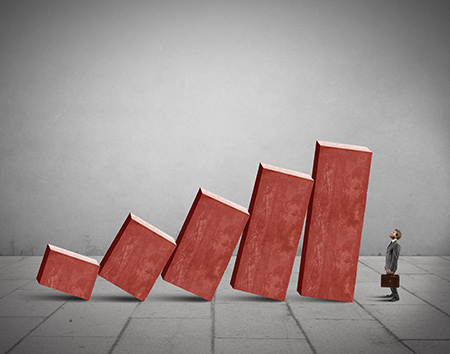
The boom and bust cycle isn’t just a characteristic of a capitalistic economy, for us in the U.S. it’s a long-time pattern that jeopardizes our retirements, our spending, our enterprise, and above all our way of life. During the ‘boom’ the economy grows, and as you can imagine, during the ‘bust’ the economy falters.
From an economics standpoint, people in the 19th and early 20th centuries understood that a time of plenty often followed a time of scarcity – banks weren’t always stable, currency was inconsistent, and many commodities came as treasures back then. Because individuals prior to the Great Depression were producers, and not consumers, lack of stability was a given and Americans knew they could only rely on themselves to survive.
Fast forward to today, and the only difference between us and people of the past is the denial of our unstable economy. Though we are told by Wall Street or the government that our economy is under control and on the mend, in reality it’s more insecure right now than it’s been in history. Our economy is failing, what are you doing about it?
Symptoms Don’t Lie
Taken from his piece Symptoms Don’t Lie, financial analyst Peter Schiff points out that our economic data reports low inflation and modest growth, but the economy shows contradicting symptoms of low growth, rising prices, and diminishing purchasing power.
Tyson Foods announced last week that though their top of the line products grew in revenue by 2%, their operating margins diminished by 50%, making for a 43% decrease in profit. Based on Tyson’s report, government analysts would say they’re a prime example of low inflation and steady growth. But in the same breath, Tyson announced that conscious consumers are not buying higher priced packaged products and moving to fresh meat cuts.
This buying shift shows how consumers are sacrificing the convenience of prepared foods for cost. According to Schiff, this behavior is symptomatic of diminished purchasing power – also known as getting poorer.
In 2002 Americans spent 17% of their income on food and energy, in 2013 we spent 21%. Spending more on necessities is another indication of getting poorer, as the poorest countries in the world devote the majority of their income to surviving.
Don’t React, Respond
There is no doubt about it, trouble has been brewing in paradise for a long time. If 2008 didn’t teach us a lesson (which it didn’t), we’ll have to keep learning from more economic busts. We can react, like we did in 2008 with quantitative easing, or each of us can start taking control of our money, our savings, and our financial freedom.
For more information on how to successfully build wealth and make it last, contact a wealth strategist at Paradigm Life.







